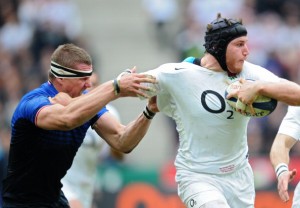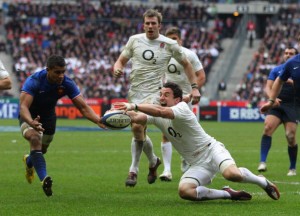By Ben Coles
BEFORE THE satisfaction should come the analysis. England scored three fantastic tries away in Paris, showing the attacking flair that the squad have always felt was within them, but which the public had yet to see.
This 24-22 win did not come easily. Compounded by ill-discipline at the breakdown, against a French scrum that forced penalties as much as it gave them away, no passage of this match was ever easy. This triumph came through every single one of England’s 111 tackles. France’s power at the breakdown was more often than not illegal and unpunished, whilst England were no angels either.
Despite the patches of individual brilliance, the game was marred by errors from both sides. They shared between them 20 handling errors, from forcing passes that were not on. The fact that Wesley Fofana and Charlie Sharples were both penalised for deliberate knock-ons highlighted the speed of both defences and also the level of risk in the majority of passes. Chris Ashton’s petulance and the penalties at the scrum all hurt England when they needed to remain composed.
But so rarely for an English performance in the Lancaster era, the positives outweigh the negatives. Owen Farrell’s options were not always perfect, at times kicking aimlessly, but his defence was outstanding. He also played such a crucial role in the build-up to Manu Tuilagi’s try, seizing the turnover ball. Certainly there were moments where he looked to be indecisive, but in the long term it is all part of his gradual growth as an international No 10.
Whilst the scrum may have conceded three penalties, it also created two crucial ones of its own. The lineout had a success rate of 72%, despite the threat of Imanol Harinordoquy in the air. Top of the pile though comes the quality of England’s tries. Tuilagi showed that he is not all about power, having the pace to finish off crucial chances. Ben Morgan’s rampaging burst could become iconic for the new England. To first fend off Thierry Dusautoir, before that offload, whilst being smothered by Harinordoquy, was a world class touch.
Perhaps Tom Croft’s decisive score though is the pick of the bunch. Maligned for his understated performances in recent games, there is no better way to thrust yourself back into the limelight than by grabbing the glory at the Stade de France. As magnificent as his try was, his work at the ruck and also along with Geoff Parling in the lineout was exceptional. It rolled back the years to arguably his greatest year in 2009, when he took not only the Aviva Premiership but also the Lions tour to South Africa by storm.
Stuart Lancaster must also receive credit for his substitutions. With Morgan not playing with the same momentum on 60 minutes, his fitness remaining a concern, Phil Dowson’s substitution looked like a gamble. Yet the commitment in his try-saving tackle on Fofana made sure it paid off, Dowson taking a stamp in the face for his troubles.
Moving on from Sunday’s success, the overwhelming clamour from the voices of supporters and across Twitter and message boards for Lancaster to get the England job full-time is hard to ignore. Winning in Paris though is a difficult achievement for any coach, let alone one so new to the international game.
Defeat Ireland next weekend and under Lancaster’s tenure, England will have won four out of five matches. The position of the RFU board is currently an unenviable one. Damned if they back the coach who has left fans and players ecstatic. Damned if they don’t and bring in the experience desired by pundits of Nick Mallett. England’s win in Paris has made the outcome all the more uncertain.








